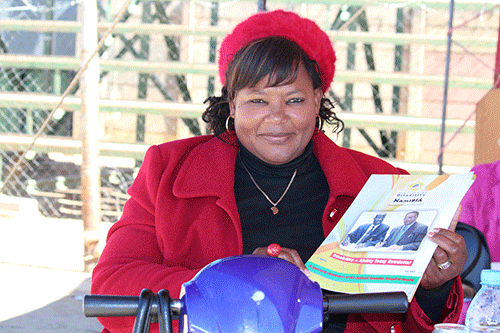Disability affairs deputy minister, Alexia Manombe-Ncube, has appealed to parliament to have sign language, used by 27 000 people, be officially recognised as one of the languages used in the country.
“Sign language is a legitimate language in its own right, with its own syntax, morphology and structure. It is capable of functioning as a language of communication in all settings, from educational to political levels,” said Manombe-Ncube.
She said this while launching the International Day of Sign Language in the National Assembly on Wednesday.
International Week of the Deaf is celebrated annually on the last week of September, this year, it falls on the week commencing 21 September.
It is a week that is celebrated by the International Deaf Community to commemorate the first World Congress of the World Federation of the Deaf in Rome in 1951. This year’s theme: ‘Sign Languages in Education’.
The theme focuses on the acquisition of sign language, as it is critical for the cognitive and social development of deaf children. Manombe-Ncube said “if we do not learn sign language, we are depriving the thousands of Namibians the ability to communicate with the rest in homes, parliament, political parties, schools, communities, churches, shops, hospitals, clinics, courts, police stations, institutions of higher learning to mention but a few”.
“It is important for the whole family to learn sign language as many deaf children are born into families where there are no deaf people, thus services must be in place to provide sign language learning and support to families so that they can learn and use sign language at home and make it easy to communicate with the deaf children and assist with educational activities,” Manombe-Ncube told parliamentarians.
She said as a country, Namibia need to strengthen the use of sign language for deaf children at an early stage.
“Our Early Childhood Development (ECD) Centres should be equipped with sign language, spoken and visual materials,” she said. She also called on the deaf communities, governments and civil society organisations to maintain their collective efforts – hand in hand – in fostering, promoting and recognising national sign languages as part of their countries’ vibrant and diverse linguistic landscapes. “We need to seriously work on recognising and promoting sign language in Namibia and where possible, finalise the documented sign to give an opportunity to many Namibians to learn sign language for easy communication with the deaf people at all avenues,” she added.
She said sign language being visual in nature provided full accessibility to deaf individuals who are recognised as belonging to a linguistic minority group specifically the right to education in their mother tongue.
“This includes the right of deaf children to the sign language of their country. The convention emphasises that without respecting linguistic rights of deaf students, their human rights cannot be fulfilled,” she charged.
“As Namibian government, we must take the necessary steps towards the official recognition of Namibian sign language,” she added.
She pleaded with lawmakers for help ensuring that Namibian sign language was fully implemented as one of Namibia’s languages.



